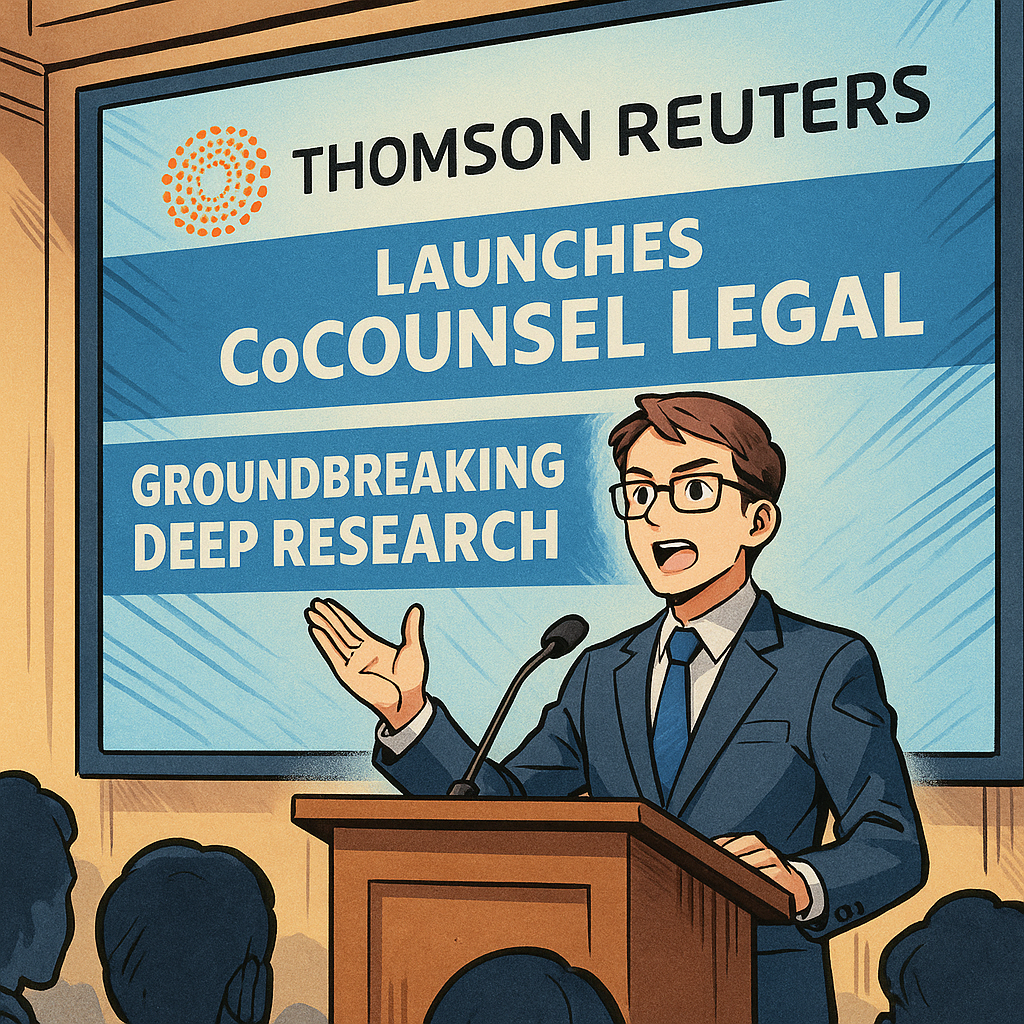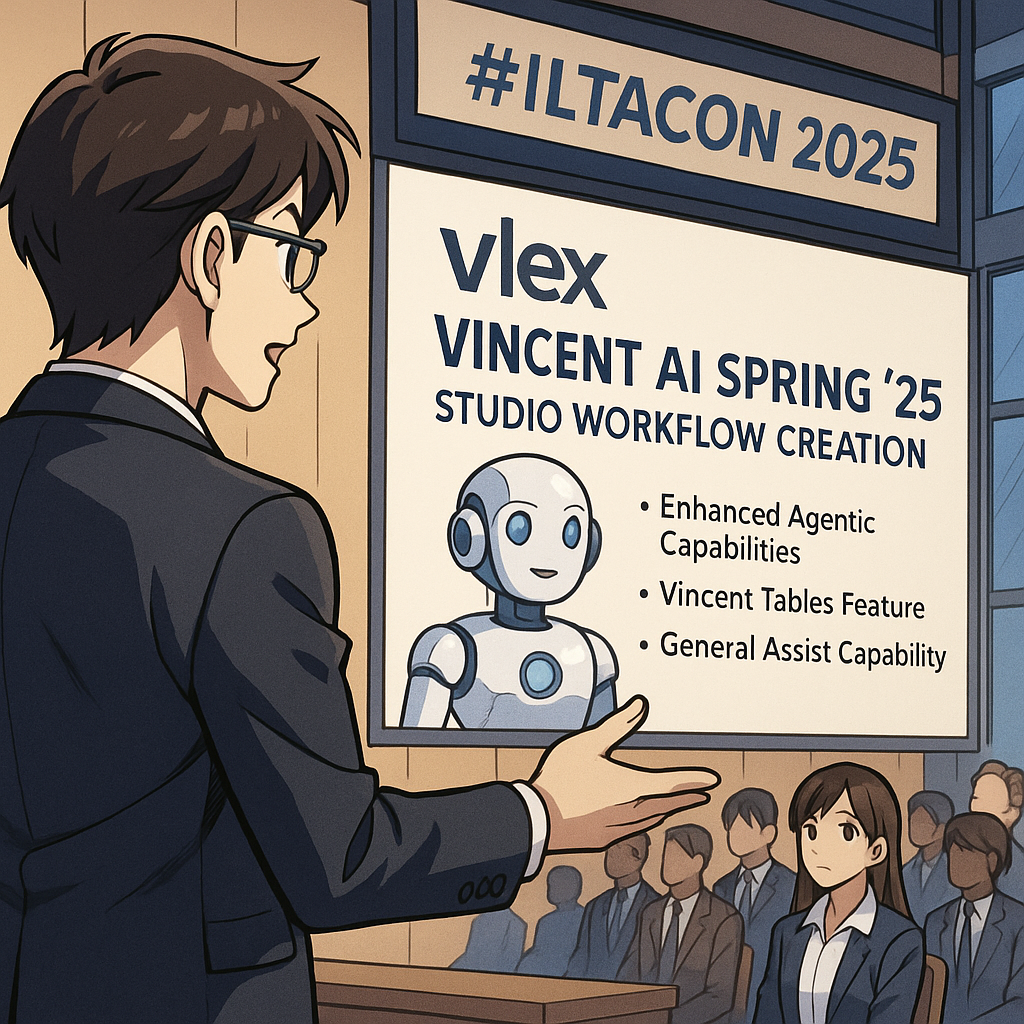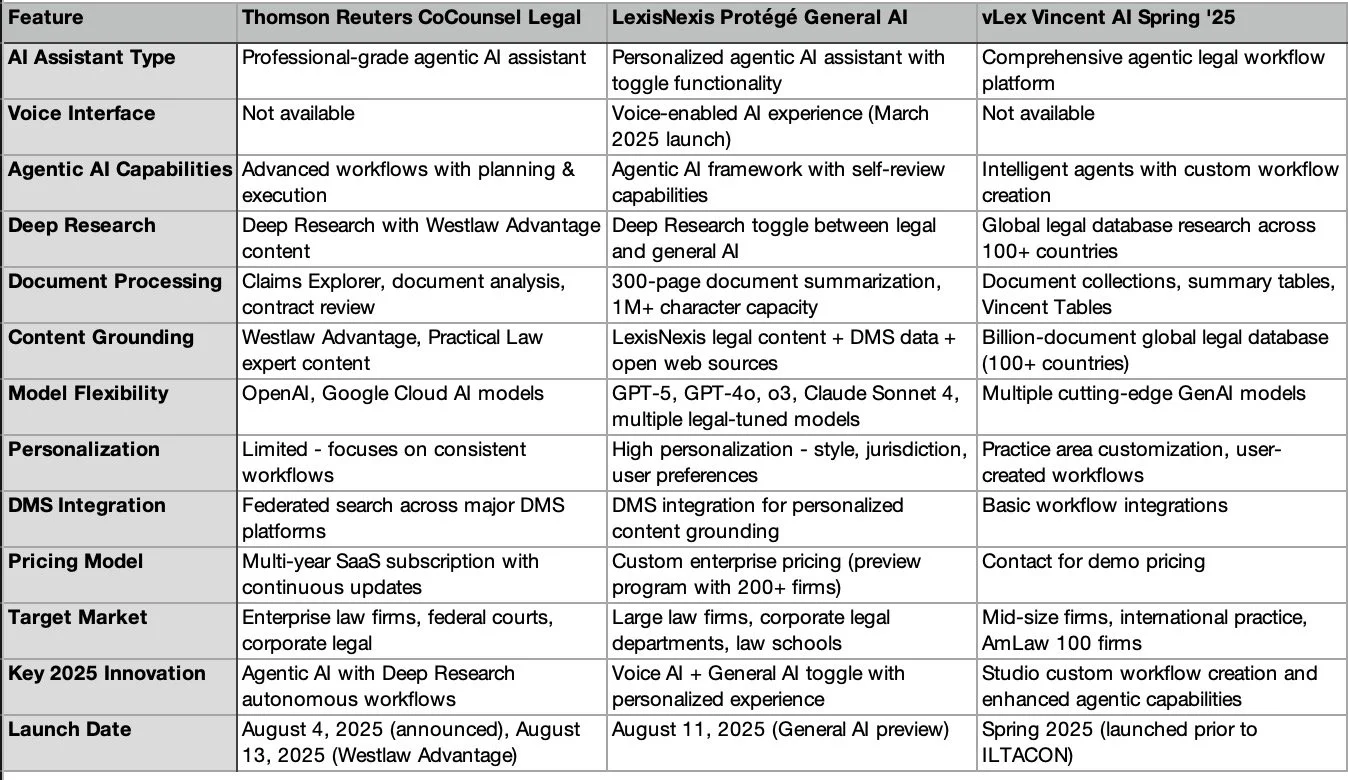ILTACON 2025: Legal AI Revolution Accelerates as Major Providers Unveil Next-Generation Platforms
/Lexis, vlex, westlaw highlight their newest ai functions!
The International Legal Technology Association’s 2025 annual conference (#ILTACON2025) in the National Harbor just outside of Washington, DC, became the epicenter of legal AI innovation as Thomson Reuters, LexisNexis, and vLex/Fastcase showcased their most advanced artificial intelligence platforms. Each provider demonstrated distinct approaches to solving the legal profession's technology challenges, with announcements that signal a fundamental shift from experimental AI tools to enterprise-ready systems capable of autonomous legal workflows.
Thomson Reuters Launches CoCounsel Legal with Groundbreaking Deep Research
Thomson Reuters made headlines with the launch of CoCounsel Legal, featuring what the company positions as industry-leading Agentic AI capabilities. This launch represents a fundamental evolution from AI assistants that respond to prompts toward intelligent systems that can plan, reason, and execute complex multi-step workflows autonomously.
The platform's flagship innovation is Deep Research, an AI feature that conducts comprehensive legal research by leveraging Westlaw Advantage’s proprietary research tools and expert legal content. According to Thomson Reuters, CoCounsel Legal combines advanced generative models with the exclusive resources of Westlaw and Practical Law, aiming to deliver trusted, up-to-date, and relevant legal analysis for practitioners. The company emphasizes that its Agentic AI operates directly within Westlaw, making use of the platform’s curated research toolset and authoritative content to enhance accuracy and reliability in legal workflows.
Thomson Reuters Launches CoCounsel Legal with Groundbreaking Deep Research
Key capabilities include guided workflows for drafting privacy policies, employee policies, complaints, and discovery requests, with Thomson Reuters planning incremental releases of new workflows. The platform addresses the critical challenge of document management system integration through federated search technology, which leverages existing Document Management System (DMS) search systems while applying AI for re-ranking and summarization.
The company also introduced Westlaw Advantage on August 13, 2025, positioned as the final versioned release of Westlaw, with future improvements delivered through continuous updates rather than new license agreements. This shift to a traditional Software-as-a-Service (aka SaaS) delivery model includes multi-year subscriptions with automatic upgrades at no additional cost.
Thomson Reuters has invested $10 billion in transforming legal technology foundations, with over $200 million annually dedicated specifically to integrating AI into flagship products. The platform already serves over 20,000 law firms and corporate legal departments, including the majority of AmLaw 100 firms.
LexisNexis Introduces Protégé General AI with Industry-First Voice Capabilities
LexisNexis announced on August 11, 2025, the preview launch of Protégé General AI, expanding its personalized AI assistant to include secure access to general-purpose AI models alongside legal-specific tools. This development builds on the company's March 2025 launch of the legal industry's first voice-enabled AI assistant for complex legal work. This voice feature allows users to interact naturally with the platform, guiding legal research and drafting by issuing spoken requests. The tool is designed to help legal practitioners streamline routine workflows, surface key insights, and perform drafting and search tasks hands-free, all within a secure and integrated environment.
LexisNexis Introduces Protégé General AI with Industry-First Voice Capabilities
Protégé's key differentiator lies in its toggle functionality, allowing users to switch between authoritative legal AI (grounded in LexisNexis content) and general-purpose AI models including GPT-5*, GPT-4o, GPT-o3, and Claude Sonnet 4. This eliminates the need to switch between different AI tools while maintaining enterprise-grade security.
The platform processes documents up to 300 pages long (a 250% increase over previous limits) and offers unprecedented personalization capabilities. It learns individual user workflows, preferences, writing styles, and jurisdictions to deliver customized responses. The system integrates with document management systems to ground responses in firm-specific knowledge while maintaining strict security controls.
Approximately 200 law firms, corporate legal departments, and law schools are participating in the customer preview program, with general availability expected later in 2025.
vLex Showcases Vincent AI Spring '25 with Studio Workflow Creation
vLex presented its Vincent AI Spring '25 Release at ILTACON 2025, highlighting enhanced agentic capabilities and the introduction of Studio, a platform allowing users to create custom workflows without coding. The company emphasized its data-centric approach, leveraging its billion-document global legal database spanning over 100 countries.
vLex Showcases Vincent AI Spring '25 with Studio Workflow Creation
vLex’s Spring ’25 release also emphasizes its Vincent Tables feature, which allows users to extract and compare key data points across large sets of documents and generate structured outputs like memos. Their General Assist capability supports drafting tasks—such as composing emails and summarizing meeting notes—within Vincent’s secure, enterprise-grade environment. Overall, vLex positions Vincent AI as a comprehensive workflow platform that delivers consistent, authoritative legal insights powered by a global database of over one billion documents from more than 100 jurisdictions.
During ILTACON, vLex also announced the 2025 Fastcase 50 awards, recognizing legal innovation leaders who are "engineering the future of legal practice". The company positioned itself as serving the "engineering minds and visionary leaders driving the legal profession's transformation".
🔎 Feature Comparison: How the Big Three Actually Stack Up
Market Positioning and Strategic Differentiation
The three providers have established distinct market positions based on their 2025 announcements. Thomson Reuters targets enterprise-level implementations, evidenced by multi-year contracts with the U.S. Federal Courts system, including the U.S. Supreme Court, and a focus on consistent, reliable workflows for large-scale legal operations.
LexisNexis emphasizes user experience and personalization, with Protégé designed to understand individual lawyer preferences and adapt to different work styles. The voice interface represents a significant advancement in accessibility and usability, particularly valuable for lawyers with physical accessibility needs or those who prefer natural language interaction.
vLex positions itself as serving both mid-size firms and AmLaw 100 practices, emphasizing comprehensive workflow solutions and global legal coverage. The Studio platform addresses the growing demand for customizable AI workflows tailored to specific practice requirements.
Final Thoughts: Industry Impact and Measurable Results
ILTACON was a great experience - I learned and hope to share a lot!
These ILTACON 2025 announcements demonstrate the maturation of legal AI from experimental tools to platforms delivering measurable business value. Case studies reveal significant cost savings, with startups like OMNIUX reporting monthly savings of $15,000 to $20,000 in legal fees using CoCounsel.
Independent analysis shows that contract review tasks, which previously required two to two and a half hours, can now be completed in 10 minutes, representing productivity improvements of over 90%. Legal professionals report that document analysis tasks requiring days of manual work can now be completed in under an hour.
The competitive landscape now features three mature approaches: Thomson Reuters' enterprise-focused agentic workflows with deep legal research integration, LexisNexis's personalized voice-enabled AI with comprehensive model flexibility, and vLex's comprehensive workflow platform with global legal intelligence.
As legal professionals evaluate these platforms, selection criteria should include firm size, practice areas, existing technology infrastructure, required customization levels, and specific workflow requirements. The legal profession's digital transformation has clearly accelerated beyond the experimental phase, with AI becoming essential infrastructure for competitive legal practice.
But what does this mean for the solo, small-, and medium-size law forms? Stay Tuned as my analysis on that will be posted soon!
Happy Lawyering!
* (Note, the original launch was supposed to include GPT-5 but it has been pulled pending resolution of issues in its program - see MTC: Why "Newer" AI Models Aren't Always Better: The ChatGPT-5 and Apple Intelligence Reality Check for Legal Professionals! for reference).














